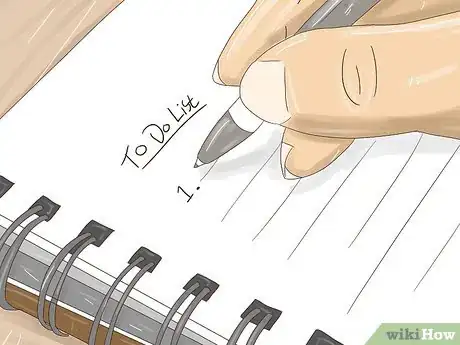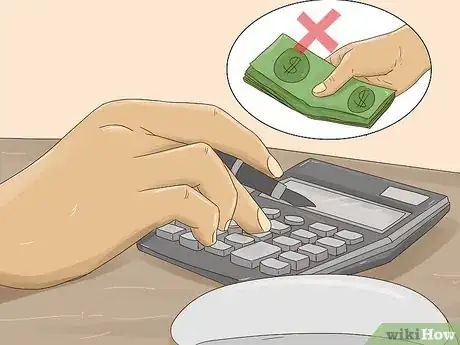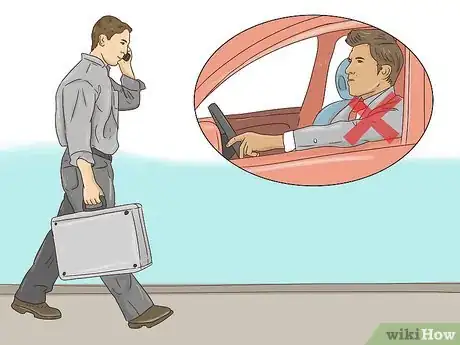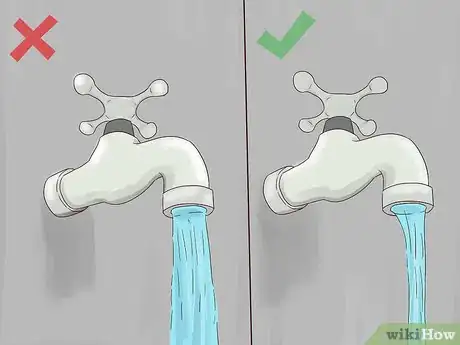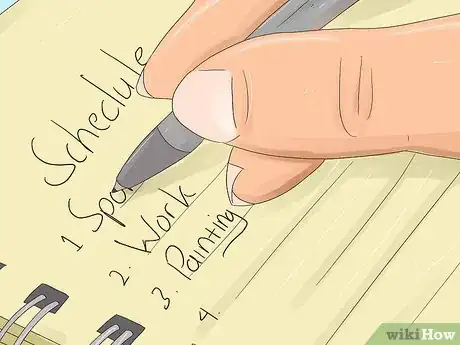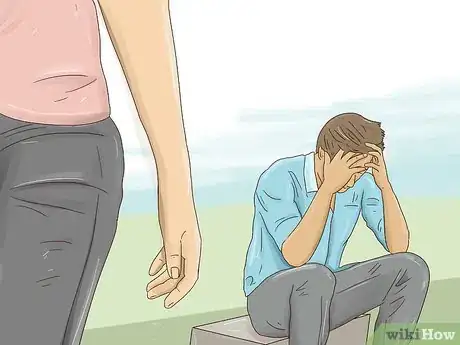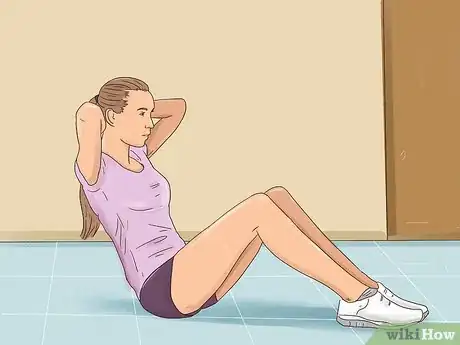This article was co-authored by Annie Lin, MBA. Annie Lin is the founder of New York Life Coaching, a life and career coaching service based in Manhattan. Her holistic approach, combining elements from both Eastern and Western wisdom traditions, has made her a highly sought-after personal coach. Annie’s work has been featured in Elle Magazine, NBC News, New York Magazine, and BBC World News. She holds an MBA degree from Oxford Brookes University. Annie is also the founder of the New York Life Coaching Institute which offers a comprehensive life coach certification program. Learn more: https://newyorklifecoaching.com
There are 19 references cited in this article, which can be found at the bottom of the page.
This article has been viewed 81,650 times.
Waste is more than simply the stuff in your trash can. You may be tolerating waste in many parts of your life, including how you spend your time and money, and where you invest your energy. If you reduce waste in your life, it will help you to restore a sense of purpose and balance.
Steps
Reflecting on Wasteful Habits
-
1Track your habits. Use a notebook to keep a record of your activities for a week, in order to recognize wasteful patterns, such as overspending or overcommitting yourself to too many things. By writing about what you focus on each day, you'll gain an appreciation of what is wasting your time and energy. The first step to changing your habits is to take note of them.[1]
-
2Reduce reckless and wasteful spending of money. It's easy to discount the value of money and to spend it without any planning. Setting aside a portion of your income each month to put into a savings account can help give you more financial freedom. Create budgets for each of your needs, such as housing, groceries, bills, and your social life.[2]
- Save money by setting a realistic spending budget and by making goals to save for bigger expenses. Save spare change in a jar, and then bring it to the bank when you have filled the jar with coins.
- Mark bills and other payment deadlines on a calendar so that you are never caught off-guard by a big expense. Preparation is key to financing your future.
Advertisement -
3Cut back on environmental waste. Evaluate your environmental impact by factoring in electricity use and gas use, along with any efforts you make to recycle and reuse materials. Think of ways to cut back on any waste of planetary resources. Try walking or riding a bike to work instead of driving, for instance. Much of what we use can be reused or recycled. Used objects can also be repaired or passed onto a friend or sibling.[3]
-
4Save money on water usage. You can reduce the amount of water you are wasting by turning it off whenever you are not actively using it, such as while brushing your teeth. Be sure to fix any leaks in faucets or toilets right away. Take short showers and limit water usage while rinsing dishes, using only what is necessary to clean. Your utility bill will surely thank you, and your carbon footprint will be reduced as well.[4]
-
5Reduce your food waste. Clean out your fridge each week and keep expiration dates of food in mind. Creating lists before you head to the grocery store can prevent needless purchases and later waste.[5]
- In the US, about 40% of food waste is generated at one's home. Be sure that you are only purchasing what you need and will eat.[6]
- Ask for food to be packaged if there is any leftover when you go out to eat. Any uneaten home-cooked meals can also be stored as leftovers. Stock up on plastic wrap and tupperware containers for easy storage in your fridge. Eat leftovers in a timely fashion to avoid the spoiling of food.[7]
Managing Your Time and Energy
-
1Plan ahead. Set goals for each day, and create a plan that will help you achieve your goals efficiently so as not to waste a minute. Planning ahead will help increase productivity, giving you more energy and time to meet your goals.[8]
-
2Reduce time-wasting habits. Stay organized and silence your cell phone. Focus on a single task at a time and follow it through to the end. Release yourself from a standard of perfection, and allow that as long as everything has a place and you are able to find it when needed, your system will work for you.[9]
- Multi-tasking can actually make you less productive and can waste your time. Make a list of everything you need to accomplish, and tackle them one task at a time.
- Spending time with organized people can motivate you to become more organized. An organized friend can not only inspire you, but can also hold you accountable for your messy habits.[10]
-
3Prevent procrastination. Limit your time online, and limit other time-wasting distractions, such as television, so that you can stay on track. Refrain from constantly being connected to the Internet and instead check your email only periodically. Creating a list of manageable goals can help you to determine how to spend your time more effectively.[11]
- Take short breaks between each task and reward yourself for completed goals in order to motivate yourself.
- Set yourself up to be accountable for your actions by letting others know your goals. Checking in periodically with a supportive friend can help you stay focused and on track.[12]
- Give yourself rewards for accomplished goals. You deserve to celebrate even your small successes, since each step you take is a move closer to your larger goal. Staying aware of how far you have come can help you to believe you will reach each of your goals.
-
4Take advantage of opportunities. Limiting yourself and refusing to take on challenges can be wasteful, impeding your progress and growth. Jump at any chances to improve yourself and make the most of them. Say “yes” to something new, and take a risk. Network with friends and peers to improve your career options. Ask for that cute stranger’s number.[13]
- Attend networking events with an open mind, and try to interact with people whom you think you can help, rather than those who might be able to help you in order to make the most meaningful connections.[14]
-
5Avoid limiting your potential. Resigning yourself to someone else’s expectations for you is a waste of your time. Discover what you are passionate about and spend time doing what you love. Expand your horizons to find where you belong and where you should expend your energy.
-
6End any unhealthy relationships. Stop wasting energy on people who drain you, and instead prioritize the people who make you feel safe, loved, and respected. Be deliberate in who you make the effort for, since some people are more selfish than others. If you find that being around a certain person drains your energy and gives you feelings of negativity, distance yourself or remove this person from your life.[15]
- Realize that your time and attention is valuable, and that you deserve only the best. If someone is treating you in a way that makes you feel uncomfortable, you should communicate this to them. Reward yourself for making moves toward distancing yourself from this toxic relationship.
- You need to put yourself first, since you are your strongest ally in life. Don't make excuses for other people's poor behavior. Just because someone is unable to give you the love you deserve, doesn't mean that you are unlovable. Release yourself from toxic relationships so that you can make room for the right person to enter your life.
-
7Embrace the pain of an ending and remain hopeful for new beginnings. Cutting ties with someone close to you is never easy, but it is necessary to our growth. Try writing about how you feel, and distracting yourself by walking in nature. Talk to a trusted friend or family member; it is never shameful to ask for help.[16]
- It is perfectly normal and healthy to cry, so don't hold back from expressing your emotions. Remember that you are loved and valuable. Take great care of yourself so that others can learn how to take care of your needs in the best possible way.
Changing Your Attitude
-
1Meditate and prioritize healthy sleep patterns. Lack of sleep leads to a lack of productivity and positivity, which is wasteful to your time and energy. Identify the causes of stress in your life, and try to work on ways to alter, avoid, or adapt to these situations. Engage in 20 minutes of mediation each day to reduce feelings of anxiety. Be sure that you are getting 7-8 hours of sleep each night.[17]
- To meditate, sit or lie down, close your eyes, and breathe naturally. Focus on each inhale and exhale.[18]
-
2Stay positive. Remaining in a negative mindset can make you feel sluggish and uninspired, and can result in a waste of your potential and energy. Recite affirmations each morning to start your day off with a good attitude. Be sure that you are reminding yourself of positive aspects of your personality, and be grateful for the good things in your life.[19]
- Let go of any anger you may have toward others by realizing that their behavior is more of a reflection of them than it is of you. Forgive them, even if it is just privately. Once you release grudges, you can focus your mind on more positive aspects of your life.[20]
-
3Practice self-care. Instead of wasting energy focusing on your flaws, refocus and applaud yourself for how much you have already grown. Communicate openly and honestly with your loved ones and roommates. Ask for help whenever needed, whether it’s from a trusted friend or a mental health professional.[21]
-
4Set aside time to eat regular meals and exercise. This will help your body and mind stay healthy. Eating breakfast is crucial, and will prevent feelings of fatigue while you exercise. Stay hydrated with water throughout each day, and you will begin to notice that you feel healthier and happier.[22]
- Choose whole grain and wheat bread over white, and avoid sugary cereals. Fruit can be an excellent source of energy and a substitute for overly sugary, processed foods.
Expert Q&A
-
QuestionHow can you stop wasting time?
 Annie Lin, MBAAnnie Lin is the founder of New York Life Coaching, a life and career coaching service based in Manhattan. Her holistic approach, combining elements from both Eastern and Western wisdom traditions, has made her a highly sought-after personal coach. Annie’s work has been featured in Elle Magazine, NBC News, New York Magazine, and BBC World News. She holds an MBA degree from Oxford Brookes University. Annie is also the founder of the New York Life Coaching Institute which offers a comprehensive life coach certification program. Learn more: https://newyorklifecoaching.com
Annie Lin, MBAAnnie Lin is the founder of New York Life Coaching, a life and career coaching service based in Manhattan. Her holistic approach, combining elements from both Eastern and Western wisdom traditions, has made her a highly sought-after personal coach. Annie’s work has been featured in Elle Magazine, NBC News, New York Magazine, and BBC World News. She holds an MBA degree from Oxford Brookes University. Annie is also the founder of the New York Life Coaching Institute which offers a comprehensive life coach certification program. Learn more: https://newyorklifecoaching.com
Life & Career Coach Set clear priorities and goals at the beginning of each day. Decide how you're going to dedicate your energy and stay focused on completing your tasks. As you get in the habit of focusing in on what you really want to accomplish, it'll be much easier to get things done and stop wasting time.
Set clear priorities and goals at the beginning of each day. Decide how you're going to dedicate your energy and stay focused on completing your tasks. As you get in the habit of focusing in on what you really want to accomplish, it'll be much easier to get things done and stop wasting time.
References
- ↑ https://www.helpguide.org/articles/stress/stress-management.htm
- ↑ http://www.goodfinancialcents.com/ways-to-save-money/
- ↑ https://www.realsimple.com/home-organizing/organizing/organizing-tips-techniques/recycle-anything
- ↑ http://eartheasy.com/live_water_saving.htm
- ↑ http://blog.rent.com/waste-not-want-not-cut-back-on-wasteful-habits/
- ↑ https://personalexcellence.co/blog/how-to-prevent-waste/
- ↑ https://www.c2es.org/blog/mandesk/thought-food-how-change-wasteful-habits
- ↑ Annie Lin, MBA. Life & Career Coach. Expert Interview. 25 November 2019.
- ↑ https://www.inc.com/chad-halvorson/7-time-wasting-habits-you-need-to-cut-out-of-your-life-for-good.html
- ↑ https://www.themuse.com/advice/the-messy-persons-guide-to-staying-organized
- ↑ Annie Lin, MBA. Life & Career Coach. Expert Interview. 25 November 2019.
- ↑ https://www.forbes.com/sites/margiewarrell/2013/03/25/why-you-procrastinate-and-how-to-stop-it-now/#357fdce61837
- ↑ https://motivationgrid.com/take-advantage-opportunities-life/
- ↑ Annie Lin, MBA. Life & Career Coach. Expert Interview. 25 November 2019.
- ↑ http://www.oprah.com/omagazine/protect-yourself-from-energy-vampires
- ↑ https://tinybuddha.com/blog/how-to-leave-a-toxic-relationship-when-youre-still-in-love/
- ↑ https://www.helpguide.org/articles/stress/stress-management.htm
- ↑ https://www.gaiam.com/blogs/discover/meditation-101-techniques-benefits-and-a-beginner-s-how-to
- ↑ http://www.mentalhealthamerica.net/stay-positive
- ↑ http://thinksimplenow.com/relationships/how-to-let-go-of-anger/comment-page-1/
- ↑ http://tinybuddha.com/blog/45-simple-self-care-practices-for-a-healthy-mind-body-and-soul/
- ↑ http://www.healthline.com/health/fitness-exercise-eating-healthy#breakfast2
